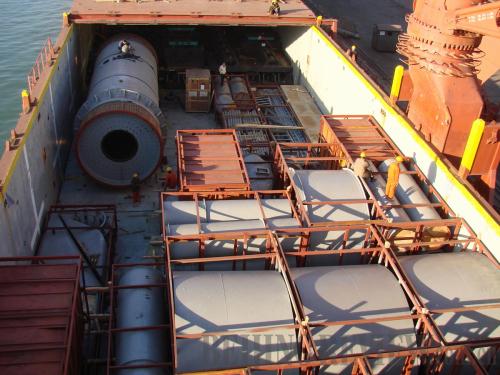|
 |
|
(COURTESY OF BARLOWORLD LOGISTICS) |
Customer-centric solution
Barloworld's customized logistics solutions have helped reduce costs and improve efficiency, despite the fact that poor infrastructure makes the costs of transporting goods in Africa among the highest in the world.
According to Wang, the solutions vary with different geographical conditions in Africa. She said that large-scale, Sino-African infrastructure projects are Barloworld's main business. "Normally, the first thing we do before the project is to make field investigation with our clients, [who are] mostly Chinese private or small and medium-sized enterprises."
However, the investigation was rarely a pleasant experience, owing to bad roads, power shortages and inadequate water and sanitation. "Some constructions materials and road equipment, such as cranes, have to be shipped from China when there were none available locally, which leads to logistics costs going up," said the manager.
Under such trying conditions, what are the most effective modes of transportations: shipping, rail or air? The company's approach is to offer tailor-made solutions according to projects' scale and practical requirements. Wang cited a Chinese aid project to a landlocked country in Central Africa several years ago as an example. "For this project, we first designed a safe shipping route for sea transportation. And then, based on our information regarding land transportation in Africa, we helped our clients to make a right choice of safe delivery from ports to inland destination."
The poor transport infrastructure is likely a more serious barrier to Barloworld's logistics service, however, even though that has not been the most difficult part of their work. The hardest part is knowing how to meet the sophisticated needs of its clients.
Unlike European and American clients who focus on the security level of any given transportation, Wang says, Africans are much more concerned with getting their goods to the destination as fast as possible, regardless of the type of cargo. "But, most cannot be directly delivered," she said. "Our tasks include finding what category the goods belong to, which airlines accept such specialized [and sometimes dangerous] goods, and what kinds of packaging meet the aviation standards."
The pressure on logistics companies to remain more cost effective has been prevalent for years. Those that are able to improve their service without increasing cost will gain a firm foothold in the industry, said Barloworld Group's CEO Clive Thomson.
According to its statistics, Barloworld's revenue in China dropped about 20 percent in 2009 as global exports slumped and cargo volume shrank in the wake of the global financial crisis. But Barloworld Logistics still put priority on the Chinese market.
"Cost controls, therefore, are always the key for our sustainable growth in the logistics business," said Wang.
Apart from centralizing customer service, risk management is Barloworld's major consideration when managing the logistics process. For instance, cargo could be stolen while awaiting customer clearance at Port of Mombasa or being transported on the way to inland Democratic Republic of Congo, Wang said. "Things can go wrong very often, even though I have double checked that everything is fine," she added.
As Obiageli Oby Ezekwesili, Vice President of the Africa Region in the World Bank, put it, such problems come from an imperfect legal system and poor performance in public management in African countries, which have been a barrier to economic growth and logistics development as well.
But she added that, years after Africa's infrastructure development - road, rail, and international flight connectivity - more possibilities are opening up for scheduled and reliable services through the combined use of different transport means.
|